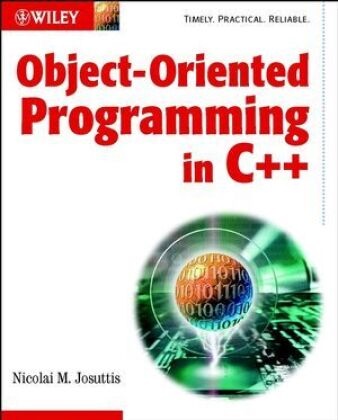Mehr lesen
Informationen zum Autor Nicolai M. Josuttis is an independent system architect, technical manager, author, consultant, and trainer who has been active in C++ standardization for over 20 years. He designs mid-sized and large software systems for the telecommunications, traffic, finance, and manufacturing industries. A former member of the C++ Standard Committee library working group, he is highly regarded and well known in the programming community for his authoritative books. Klappentext C++ is now established as one of the leading industry programming languages for object-oriented software development. Its advantages over other languages include speed and flexibility. It is used as the base for many commercial software products and for performance solutions to complex problems. Not often taught as the primary programming language, students are frequently expected to pick up the language for themselves. This book is an ideal student self-learning guide.As a step-by-step tutorial, this book teaches all language features and explains their practical usage. Intuitive examples are used that are neither too complex to distract, nor oversimplified. A key concept in C++ is programming with templates, which can help to program generic solutions - for example implementing polymorphism. Nicolai Josuttis teaches how to combine templates with object-oriented programming to produce the power of modern C++ development for high performance programs. It is a book that goes well beyond the basics.A supplementary website, including source code, can be found at www.josuttis.com/cppbookFeatures:* comprehensive, detailed, readable, practical and up-to-date* teaches how to get the power from C++, using the current ANSI language standard and programming mode* specific hints help C and Java programmers switch and compare languages.* website provides more examples and links to useful online resources. Zusammenfassung Objektorientierte Programmierung in C++: Hier werden Sie Schritt für Schritt mit den Grundzügen, aber auch mit fortgeschrittenen Aspekten vertraut gemacht! Alle Sprachmerkmale werden im Zusammenhang mit der praktischen Anwendung besprochen. Ein Schlüsselkonzept von C++ zur Implementierung generischer Algorithmen ist die Programmierung mit Templates. Wie man Templates mit objektorientierter Programmierung verknüpft, um die Möglichkeiten der Sprache zur Erstellung hochperformanter Programme zu nutzen, wird hier gezeigt. Inhaltsverzeichnis Preface to the English Edition.Preface to the Second Edition.Preface to the First Edition.1. About this book.Why this Book?Prerequisites.Organization of the Book.How Should you Read this Book?Access to Sources for the Examples.Feedback.2. Introduction: C++ and Object-Oriented Programming.The C++ Language.C++ as an Object-Oriented Programming Language.Other Concepts of C++.Teminology.3. Basic Concepts of C++ Programs.The First Program.Types, Operators and Control Constructs.Functions and Modules.Strings.Processing Collections.Exception Handling.Pointers, Arrays, and C-strings.Memory Management using new and delete.Communication with the Outside World.4. Class Programming.The First Class: Fraction.Operators for Classes.Running Time and Code Optimization.References and Constants.Input and Output Using Streams.Friends and Other Types.Exception Handling for Classes.5. Inheritance and Polymorphism.Single Inheritance.Virtual Functions.Polymorphism.Multiple Inheritance.Design Pitfalls with Inheritance.6. Dynamic and Static Members.Dynamic Members.Other Aspects of Dynamic Members.Inheritance of Classes with Dynamic Members.Classes Containing Classes.Static Members and Auxiliary Types.7. Templates.Why Templates?Function Templates.Class Templates.Non-Type Template Parameters.Additional Aspects of Templates.Templates in Practice.8. The Standard I/O L...

